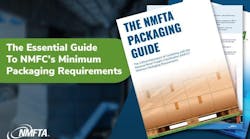A visitor to the FedEx Express Bronx, NY, facility would see what they see at any FedEx Express facility throughout North America — workers busily preparing packages for their final destinations and trucks, mostly step vans, lined up waiting to take packages on their final journey, one that may have started several continents away. But what makes the Bronx center different from all the rest are the vehicles that will haul those packages to their final stops.
With the purchase of 51 gasoline-electric hybrid vehicles from Azure Dynamics Corp., the Bronx facility is the first Express center to operate only hybrid vehicles in its package delivery operations.
“At Express, we've established a goal to improve our fuel efficiency by 20% by 2020,” says John Formisano, vp of global vehicles for FedEx Express, a subsidiary of FedEx Corp. “Right now, we're evaluating what technologies are best. [The programs] are really goal-focused. It's now how many hybrids we buy each year.”
Formisano explains that Express, which began looking at alternative fuel and alternative power for vehicles back around 2000, is currently focusing on three different programs. One is the Azure system these trucks represent, a second is a program with Freightliner Custom Chassis Corp. (FCCC) offering an Eaton Corp. hybrid system, and a third is the conversion of an FCCC chassis truck with Cummins diesel engines to hybrid-electric power. That program saw the conversion of 92 such vehicles in 2009.
For the Bronx center, the addition of the 51 vehicles brings to 100 the total number of hybrid vans there servicing the Manhattan area. Because of the stop-and-go nature of city driving, combined with the cargo of Express packages, which tend to be lighter than other delivery packages, the hybrid-electrics made a nice fit in the Bronx, Formisano says.
“What we're finding in a medium-duty fleet is up to a certain mileage, diesel is not really a requirement,” he points out. “Our mission at Express is high value per pound, so weight is not really an issue for us.”
With the additional trucks, FedEx Express has 325 hybrid electric and electric vehicles and over 1,800 alternative fuel vehicles and equipment in its 45,000-vehicle fleet. “In North America, we've had the opportunity to build our own hybrids,” Formisano says, whereas outside the U.S. “it's a very vertical process.”
The Azure trucks use electric-launch assist with engine-off at idle. Due to its use of regenerative braking, the vehicles can take advantage of frequent stops to recharge the batteries, resulting in a 40-50% fuel efficiency gain, depending on duty, Formisano says.
“The tough driving and delivery conditions of New York City, mainly the stop-and-go traffic, is an ideal environment to prove that efficient and cleaner transportation technologies are a viable alternative to conventionally equipped trucks,” says Mitch Jackson, director of Environmental Affairs and Sustainability, FedEx Corp.
While Express focuses on improving its fuel efficiency, Formisano says the company is not focused on only one solution. All-electric vehicles may have a future, he says, where the delivery runs are short and charging facilities are readily available. Diesel will continue to play a role as will other variations and alternative fuel vehicles. In fact, sister company FedEx Ground is testing a Class 6 hydraulic hybrid vehicle with Parker Hannifin Corp.
“We've found it's best to use the technology in its sweet spot,” Formisano adds, pointing to the different technologies the company employs around the country.
Some companies may be taking advantage of grants and incentives to purchase hybrid vehicles now, but for Express, which has logged over five million miles on the technology, hybrids are not new. “The technology works,” Formisano says. “We're in a position at Express to be … able to show that it works and hopefully down the road, as costs come down, it will be mainstream and when a company purchases hybrid trucks, it will not be news anymore.”


